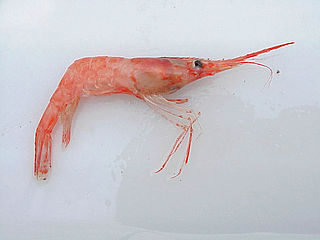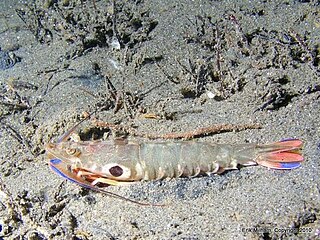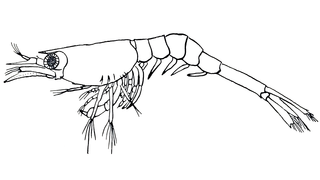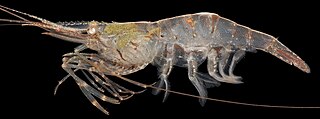
Xanthidae is a family of crabs known as gorilla crabs, mud crabs, pebble crabs or rubble crabs. Xanthid crabs are often brightly coloured and are highly poisonous, containing toxins which are not destroyed by cooking and for which no antidote is known. The toxins are similar to the tetrodotoxin and saxitoxin produced by puffer fish, and may be produced by bacteria in the genus Vibrio living in symbiosis with the crabs, mostly V. alginolyticus and V. parahaemolyticus.

Alpheopsis is a genus of shrimp of the family Alpheidae. Several species of the genus have been known to share the same burrows with members of different species. They are inhabitants of the eastern Pacific Ocean.

Betaeus is a genus of shrimp in the family Alpheidae, containing the following species:

Majidae is a family of crabs, comprising around 200 marine species inside 52 genera, with a carapace that is longer than it is broad, and which forms a point at the front. The legs can be very long in some species, leading to the name "spider crab". The exoskeleton is covered with bristles to which the crab attaches algae and other items to act as camouflage.

Ozius is a genus of crabs in the family Menippidae, containing the following species:

Palaemon is a genus of caridean shrimp in the family Palaemonidae.

Inachidae is a family of crabs, containing 39 genera:

Lysmata is a genus of shrimp in the infraorder Caridea, the caridean shrimp. The genus belongs to the family Lysmatidae. Lysmata are popular ornamental shrimp in the marine aquarium trade for their bright color patterns, interesting behaviors, and ability to control certain aquarium pests such as sea anemones of the genus Aiptasia. They are known to command high prices on the pet market.

Leucosiidae is a family of crabs containing three subfamilies and a number of genera incertae sedis:

Pandalus is a genus of shrimp in the family Pandalidae. Members of the genus are medium-sized and live on or near the seabed. Some species are the subject of commercial fisheries and are caught by trawling. One species, Pandalus montagui, lives in association with the reef-building polychaete worm, Sabellaria spinulosa.

Sicyonia is a genus of prawns, placed in its own family, Sicyoniidae. It differs from other prawns in that the last three pairs of its pleopods are uniramous, rather than biramous as seen in all other prawns.

Cyclograpsus is a genus of crabs, containing the following species:

A shrimp is a crustacean with an elongated body and a primarily swimming mode of locomotion – typically belonging to the Caridea or Dendrobranchiata of the decapod order, although some crustaceans outside of this order are also referred to as "shrimp".

Crangon allmani, also spelled Crangon allmanni, is a species of shrimp in the genus Crangon. It is at home in the northeast Atlantic Ocean. Its specific name, allmani, honours the Irish natural historian George J. Allman. According to J. A. Allen, the spelling allmanni is a writing error and the correct spelling is allmani.

Pachycheles is a genus of porcelain crabs in the family Porcellanidae. There are more than 40 described species in Pachycheles.

Palaemon macrodactylus is a species of shrimp of the family Palaemonidae.

Periclimenes, commonly known as glass shrimp or cleaner shrimp, is a commensal and often symbiotic genus of semi-transparent shrimp within the family Palaemonidae. Species of this large genus feature a wide variety of coloration and patterns, widespread distribution throughout much of the world's tropical oceans, and are often sought out for aquarium trade.

Heptacarpus is a genus of shrimps in the family Thoridae. There are more than 30 described species in the genus Heptacarpus.

Leptuca is a genus of fiddler crabs belonging to the family Ocypodidae.



















